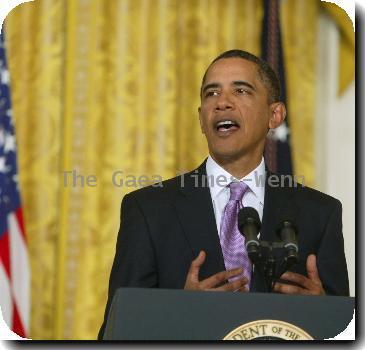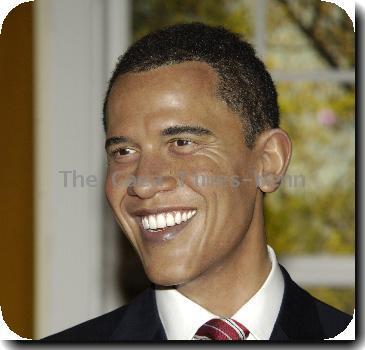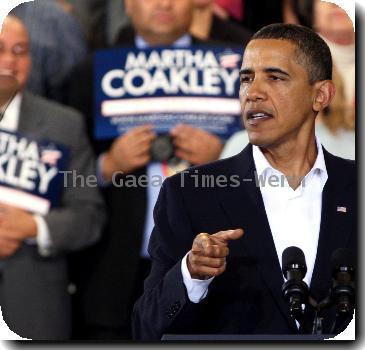AP sources: Obama will ask to freeze a part of govt spending for 3 years beginning in 2011
By Ben Feller, APMonday, January 25, 2010
AP sources: Obama to seek freeze on part of budget
WASHINGTON — Facing voter anger over mounting budget deficits, President Barack Obama will ask Congress to freeze spending for some domestic programs for three years beginning in 2011, administration officials said Monday. Separately, Obama unveiled plans to help a middle class “under assault” pay its bills, save for retirement and care for kids and aging parents.
The spending freeze would apply to a relatively small portion of the federal budget, affecting a $477 billion pot of money available for domestic agencies whose budgets are approved by Congress each year. Some of those agencies could get increases, others would have to face cuts; such programs got an almost 10 percent increase this year. The federal budget total was $3.5 trillion.
The three-year plan will be part of the budget Obama will submit Feb. 1, senior administration officials said, commenting on condition of anonymity to reveal private details. They said Obama was expected to propose the freeze Wednesday night in his State of the Union address.
The Pentagon, veterans programs, foreign aid and the Homeland Security Department would be exempt from the freeze.
The savings would be small at first, perhaps $10 billion to $15 billion, one official said. But over the coming decade, savings would add up to $250 billion.
The White House is under considerable pressure to cut deficits — the red ink hit a record $1.4 trillion this year — or at least keep them from growing. Encouraged by last week’s Massachusetts Senate victory, Republicans are hitting hard on the issue, and polls show voters increasingly concerned.
Obama’s separate public comments previewed other topics in the State of the Union address.
The proposals he described won’t create jobs, but he said they could “re-establish some of the security that’s slipped away.” His remarks aimed to lift the nation’s dour mood and show he is in touch with the daily struggles of millions of people as resentment runs high about lost jobs and the economy.
The initiatives amount to a package of tax credits, spending expansions and new mandates on employers to encourage retirement savings by workers. Most of them will be included in Obama’s budget for the fiscal year starting Oct. 1, and they will require approval from Congress. Obama will release that budget Feb. 1.
The president’s latest rollout of ideas served as a preview of his prime-time State of the Union address. The economic elements of that speech will also cover Obama’s plans to boost job creation and reduce swelling budget deficits — areas of concern to the public.
Obama’s address will outline his second-year agenda across a spectrum of issues, including tighter rules on Wall Street behavior and a push for financial discipline in Washington. He also is expected to touch on the controversial issue of gays in the military.
Among the president’s economic ideas:
—Nearly doubling the tax credit that families making under $85,000 can receive for child care costs, with some help for families earning up to $115,000, too.
—Capping the size of periodic federal college loan repayments at 10 percent of borrowers’ discretionary income to make payments more affordable.
—Increasing by $1.6 billion the money pumped into a federal fund to help working parents pay for child care, covering an estimated 235,000 additional children.
—Requiring employers who don’t offer 401(k) retirement plans to offer direct-deposit IRAs for their employees, with exemptions for the smallest firms.
—Spending more than $100 million to help people care for their elderly parents and get support for themselves as well.
The White House maintained that its imperative still is to create jobs. Unemployment remains in double digits, and the economy is the public’s top concern. Yet Obama said that squeezed families need help in other ways, too: paying for child care, helping out aging parents, saving for retirement, paying off college debt.
What matters ultimately to people, Obama said, is “whether they see some progress in their own lives. So we’re going to keep fighting to rebuild our economy so that hard work is once again rewarded, wages and incomes are once again rising, the middle class is once again growing.”
Less clear was how much the programs would cost or where the money would come from.
Officials deferred comment until the release of the budget.
Obama, whose poll numbers are off, is trying to sharpen his economic message in a way that shows people he is on their side. White House officials say they know people have been turned off by the long, messy fight for health insurance reform. Plus, there’s a perception that families have gotten far less help than big banks.
The economy is growing, but not fast enough to bring down widespread joblessness. The unemployment rate is at 10 percent and most economists say it could take until at least 2015 for it to return to more normal levels.
The plans Obama set forth came from the yearlong work of a task force, led by Vice President Joe Biden, that was charged with helping the middle class.
“We’re talking about dignity. We’re talking about security,” Biden said. “We’re talking about knowing your pension is safe, your health insurance is reliable, your elderly parents and your children are going to be cared for, your neighborhood is safe.”
Obama’s initiatives also include expanding and simplifying a tax credit that matches retirement savings, and making 401(k) rules easier to understand.
On the matter of gays in the military, Obama has promised to lift the ban on gays serving openly, and several lawmakers support a repeal of the law. But some senior military advisers and members of Congress have urged the president not to shake up the status quo at a time of two wars.
Sen. Carl Levin, chairman of the Armed Services Committee, said he had planned to convene a hearing on the issue in January, but that the Obama administration asked him to hold off until the president’s national address.
“We were told by the Pentagon that they expected the president to say something in the State of the Union on it,” Levin said.
Levin, who favors repealing the law, said he does not know what Obama will say. He said he plans to hold hearings in February and would like to hear testimony from Defense Secretary Robert Gates and Chairman of the Joint Chiefs of Staff Gen. Mike Mullen.
Tags: 2010 State Of The Union Address, Barack Obama, Child Care, District Of Columbia, Events, Executive Branch, Financial Planning, Military Affairs, North America, Personal Finance, Personal Investing, Personnel, State of the union, State Of The Union Address, United States, Washington















